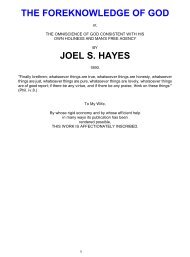Are Men Born Sinners? - Library of Theology
Are Men Born Sinners? - Library of Theology
Are Men Born Sinners? - Library of Theology
You also want an ePaper? Increase the reach of your titles
YUMPU automatically turns print PDFs into web optimized ePapers that Google loves.
Christ, he points out that Levi had descended from Abraham, who, as great as he was,<br />
had still paid tithes to Melchisedec, so that Levi also, as a descendant <strong>of</strong> Abraham (yet in<br />
the loins <strong>of</strong> Abraham when he paid tithes), was also inferior and subservient to<br />
Melchisedec and his priesthood. And in this typical sense only, as a descendant <strong>of</strong> one<br />
who had shown he was inferior and subservient to Melchisedec by paying tithes to him,<br />
had Levi paid tithes to Melchisedec.<br />
The writer to the Hebrews shows that he is speaking <strong>of</strong> Levi paying tithes in Abraham in<br />
a typical sense by the language he uses. He says, "And as I may so say, Levi also, who<br />
receiveth tithes, paid tithes in Abraham." Heb. 7:19. The phrase "as I may so say" is a<br />
limiting or qualifying phrase, which means "I could say," or "I might say." The writer to<br />
the Hebrews never gave to his statement about Levi any other than a typical sense,<br />
otherwise he would not have limited his statement with the words, "And as I may so<br />
say..." Heb. 7:19.<br />
To teach from this passage that either the good or the evil that our ancestors have done is<br />
actually done by us is to wrest this passage from its context and to torture it into teaching<br />
utter nonsense. For instance, such an idea would make all the descendants <strong>of</strong> a Christian<br />
automatic Christians if his children were yet in his loins when he believed. Also, it would<br />
seem to make all the descendants <strong>of</strong> one who rejects the Gospel automatic unbelievers for<br />
coming out <strong>of</strong> the loins <strong>of</strong> an unbelieving father. In fact, if this theory is true, every good<br />
act <strong>of</strong> a man or every evil act <strong>of</strong> a man is counted as done by all <strong>of</strong> his <strong>of</strong>fspring. But the<br />
problem with all <strong>of</strong> this is that we know that many godly men have had descendants who<br />
were enemies <strong>of</strong> God and vice versa. Abraham is an example <strong>of</strong> this. The Bible says that<br />
Abraham believed God and that his faith was counted unto him for righteousness, and<br />
Abraham is called the father <strong>of</strong> the faithful because <strong>of</strong> his faith. But Abraham has had<br />
millions upon millions <strong>of</strong> descendants who have not believed and have been lost. Yet<br />
according to the theory under question, all <strong>of</strong> Abraham's descendants should have been<br />
justified by his faith, for they were all yet in his loins when he believed God and was<br />
justified. Esau was a descendant <strong>of</strong> Abraham but God said, "Jacob have I loved, but Esau<br />
have I hated." Rom. 9:13. God destroyed the children <strong>of</strong> Israel (who were descendants <strong>of</strong><br />
Abraham) in the wilderness for their unbelief, even though they were "yet in the loins <strong>of</strong><br />
Abraham" when he believed.<br />
The problems with this nonsensical theory multiply when you realize that everyone <strong>of</strong> us<br />
have been "in the loins" <strong>of</strong> numerous ancestors going all the way back to Adam. This<br />
means that we actually participated in all the good and evil not only <strong>of</strong> Adam, but also <strong>of</strong><br />
all our intervening ancestors as well. What an awful lot <strong>of</strong> good and evil we have done.<br />
We have all been busy for thousands <strong>of</strong> years in the loins <strong>of</strong> our ancestors doing good and<br />
evil!<br />
Now, do we get to pick and choose among our ancestors, choosing the ancestors whose<br />
deeds we like most, or must we heap them all together and take what they all have done?<br />
I am afraid that to do the latter would make our character quite a confused and conflicting<br />
thing. What if some <strong>of</strong> our ancestors were Christians and others were unrepentant






